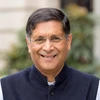Arvind Subramanian
)
Arvind Subramanian
Arvind Subramanian is former chief economic advisor to the Government of India, and is currently a senior fellow at the Watson Institute for International and Public Affairs at Brown University. He was earlier the assistant director in the research department of the International Monetary Fund, and has taught at Harvard University's Kennedy School of Government, Johns Hopkins School for Advanced International Studies, and has been a Professor of Economics at Ashoka University.
Arvind Subramanian is former chief economic advisor to the Government of India, and is currently a senior fellow at the Watson Institute for International and Public Affairs at Brown University. He was earlier the assistant director in the research department of the International Monetary Fund, and has taught at Harvard University's Kennedy School of Government, Johns Hopkins School for Advanced International Studies, and has been a Professor of Economics at Ashoka University.
Arvind Subramanian
When the US and China turn rogue, the global economy pays the price
With US protectionism and China's mercantilist push reinforcing each other, developing nations are caught in a global trade squeeze that threatens growth, jobs, and convergence
'A Sixth of Humanity': Revisiting the idea and project of India
Instead of listing reforms, A Sixth of Humanity by Arvind Subramanian and Devesh Kapur identify necessary conditions that would give India a fair shot at solving important challenges ahead. An excerpt
The new 'China Shock' threatens developing economies, not the West
If China truly aspires to global leadership, it must vacate the low-skill manufacturing space in favour of developing countries
The good and simple tax? All eyes on GST Council's two high-rate slabs
This article visually summarises, in two tables, how not-simple the GST is, which leads to serious but under-recognised problems of arbitrary and coercive implementation
The stealth reform of India's electricity sector gains quiet traction
To ease utility opposition and win approval, renewables are framed as captive generation-meant to meet the developer's own energy needs
Why manufacturing-led export still matters for the poor countries
What made the traditional development model so successful was its reliance on exports, which enabled countries like South Korea to tap into virtually unlimited global demand
Reducing GDP discrepancies: India needs radical improvements in estimation
Using GST data could help correct inflated real growth figures
US President Donald Trump and trade policy: What should India do?
The country should convert the Trump threat to an India opportunity, re-embracing a more liberal trade regime as a way of reviving manufacturing output and exports
How quality control orders are crippling India's trade competitiveness
India's exporters are already under dire threat from the US. That only makes it more important that they should not be attacked from the domestic side. QCOs must be eliminated immediately
Why did RBI replace flexible exchange rate with de facto peg against dollar
The RBI must come out with an official explanation, but until it does, we can only guess. But there are a few reasonable hypotheses
Rupee defence strategy: Why RBI should embrace currency flexibility
India now holds about $650 billion in reserves, enough to finance nearly a year of imports. The problem is that global financial markets have even more firepower
The new RBI should revert to old rupee policy to address challenges
In our earlier piece in these pages, we highlighted the unwelcome consequences of the exchange rate policy adopted under the outgoing Reserve Bank of India (RBI) regime
Why Trump's return to the White House is an opportunity for India
A more principled response would be to initiate talks with the US on a bilateral deal or free-trade agreement. India stands to gain from trade liberalisation
Explained: Has India's exchange rate regime changed for the worse?
Ever since the liberalisation in 1991, the RBI has pursued a flexible exchange rate policy
Institutions rule: COCD's path to the Nobel in economics this year
Why Colonial Origins of Comparative Development is Nobel-worthy
India's manufacturing under-performance Part 1: New clue from multi-plants
One of the most intriguing and relatively undocumented developments of the last 20 yrs has been "multi-plants," whereby a single firm operates not one but multiple production facilities within a state
India's manufacturing under-performance Part 2: New clue from multi-plants
In multi-plant units, flexibility in hiring & firing labour comes from fact of having many plants. In single plants, there is no such flexibility, which renders use of contract labour more important
Why restrictive trade responses fail to halt China's export juggernaut
US and Europe should understand the issues and discuss them with China, tailoring responses to the underlying diagnosis, rather than taking knee-jerk protectionist measures that only stoke tensions
Union Budget 2024-25: Three macro puzzles and policy implications
Why is consumption soft, employment growth weak, and core inflation low, when the economy is apparently growing strongly?
GST revenues: The fate of the compensation cess amid Centre-state row
There's no reason for the cess to be retained in its current form. That's because the cess rates themselves are monstrously complicated, varying not only in magnitude but also according to end-use

